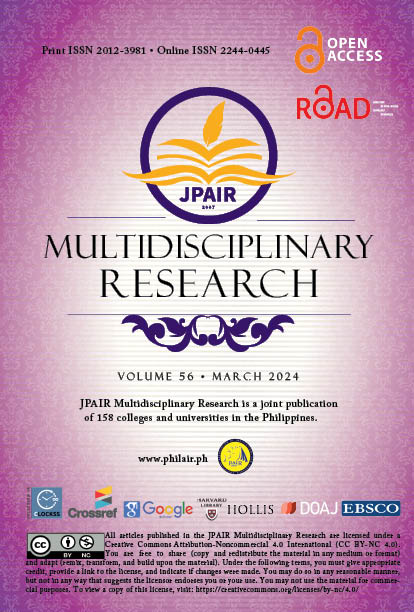The Degree of Implementation of Waste Management on Ship
DOI:
https://doi.org/10.7719/jpair.v56i1.881Keywords:
Ship Waste , Management, Degree, Implementation, Disposal, Management Plan, Quantitative, survey, Surigao City, policy development, Philippines , AsiaAbstract
Ships generating waste pose a significant environmental challenge in the maritime sector. This research aims to assess how effectively waste management practices are implemented by maritime personnel to mitigate the environmental impacts of onboard waste. Data gathered from survey questionnaires were analyzed using a quantitative research design, focusing on responses from chief officers and second engineers of ships. A four-point Likert scale was employed, and results were evaluated using frequency percentages, weighted means, and the Chi-square statistical analysis. The study aimed to profile the ship's crew and evaluate the implementation of waste management strategies, particularly regarding waste management plans and waste disposal onshore and ship-to-shore. The findings indicate that waste management implementation at the Port of Surigao's ships was fully achieved. These results underscore the importance of comprehensive waste management systems and training to ensure consistency in perceptions and practices among maritime officers. Therefore, the researchers suggested that ship operators can reduce environmental impact and promote sustainability in the maritime industry by developing a comprehensive waste management plan, providing crew training, installing effective waste segregation facilities, implementing recycling initiatives, and conducting regular audits.
Downloads
References
Andersen, J., & Becker, T. (2018). A comprehensive study on ship-generated waste management in the Baltic Sea. Waste Management, 79, 495-506.
Belokas, A. (2018, March 6). Training isn’t important; it is vital. Safety4Sea. https://safety4sea.com/training-isnt-important-it-is-vital/
Career Guide. (2022). Retrieved from Career Development: https://ca.indeed.com/
Downloads
Published
Issue
Section
License
Copyright (c) 2024 Derek Mar O. Montallana, Herminigildo A. Mausisa, Renz Ian U. Aquino, Jade Nathaniel R. Balacuit, Feldan M. Menil, Marc Leo R. Roferos, Jezryll G. Yaon

This work is licensed under a Creative Commons Attribution-NonCommercial 4.0 International License.
Open Access. This article published by JPAIR Multidisciplinary Research is licensed under a Creative Commons Attribution-Noncommercial 4.0 International (CC BY-NC 4.0). You are free to share (copy and redistribute the material in any medium or format) and adapt (remix, transform, and build upon the material). Under the following terms, you must give appropriate credit, provide a link to the license, and indicate if changes were made. You may do so in any reasonable manner, but not in any way that suggests the licensor endorses you or your use. You may not use the material for commercial purposes.





















